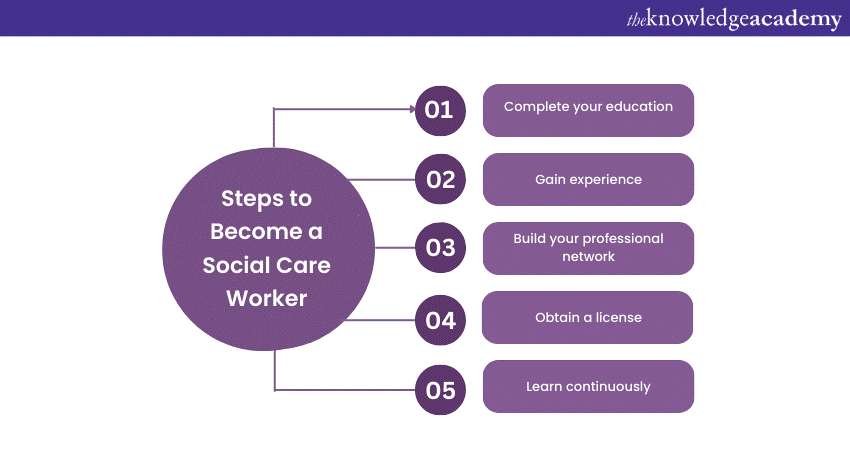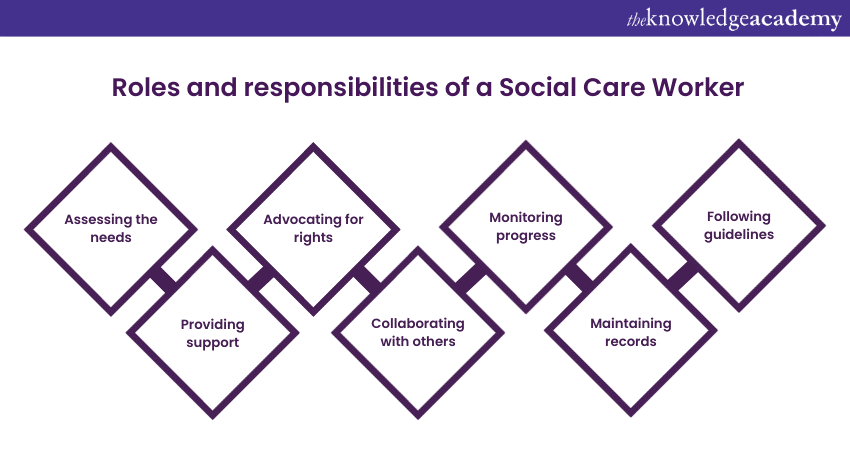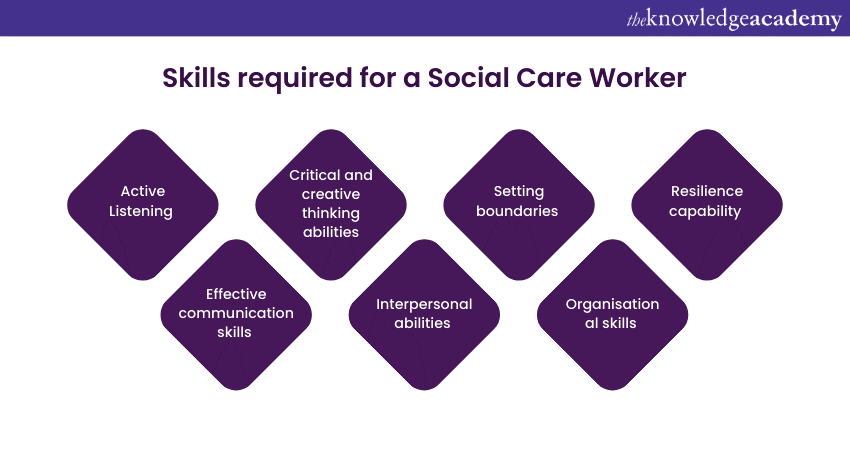We may not have the course you’re looking for. If you enquire or give us a call on +1800812339 and speak to our training experts, we may still be able to help with your training requirements.
Training Outcomes Within Your Budget!
We ensure quality, budget-alignment, and timely delivery by our expert instructors.

Are you interested in a career that lets you make a positive difference in the lives of others? Do you enjoy helping people overcome their challenges and achieve their goals? If yes, then you might want to consider becoming a Social Care Worker. But How to Become a Social Care Worker?
Social Care Workers are vital members of society who work with families, communities and individuals to improve their well-being and quality of life. So, if you are interested in becoming a Social Worker and curious to learn How to Become a Social Care Worker, then this blog is for you.
This blog explores How to Become a Social Care Worker, their roles and responsibilities, the skills required, and the career paths in social work. Let’s dive in!
Table of Contents
1) What is a Social Care Worker?
2) How to Become a Social Care Worker?
3) Roles and responsibilities of a Social Care Worker
4) Skills required for a Social Care Worker
5) Career paths in Social Work
6) Conclusion
What is a Social Care Worker?
A Social Care Worker is a professional who provides support and assistance to people who are in need of care and protection. Social Care Workers work with various groups of people, such as children, the elderly, the disabled, the homeless, refugees, and more. They help them cope with their personal, social, and emotional issues and enable them to access the resources and services they need.
Social Care Workers can work in different settings, such as residential homes, day centres, schools, hospitals, prisons, and community organisations. They can also specialise in different areas, such as child protection, mental health, substance abuse, domestic violence, and more.

How to Become a Social Care Worker?
Now that you understand what a Social Care Worker is, you might be curious to know How to Become a Social Care Worker. So, let's explore the steps involved:

1) Finish your education
The minimum educational requirement for a Social Care Worker is a bachelor’s degree in social work, Social Care, or a related field. Some employers may also accept a diploma or a certificate in Social Care or a related field. However, having a higher degree, such as a master’s or a doctorate, can increase your chances of getting a better job and a higher salary. You can also pursue further education and training to specialise in a specific area of social work.
2) Acquire practical experience
To become a competent and effective Social Care Worker, you need to have practical experience in working with people in need of care and protection. You can gain this experience by doing internships, placements, or volunteer work in Social Care settings, such as residential homes, day centres, schools, hospitals, prisons, and community organisations.
You can also join professional networks and associations to learn from other Social Care Workers. This helps stay updated on the latest trends and developments in the field.
3) Grow your professional connections
To become a successful Social Care Worker, you need to have strong professional connections with other Social Care Workers, as well as with other professionals and agencies involved in the Social Care sector. You can build and maintain these connections by attending seminars, workshops, conferences, and events related to Social Care.
You can also use social media platforms, such as LinkedIn, X, and Facebook, to network with other Social Care Workers and share your insights and experiences.
4) Obtain a license or registration
To become a qualified and recognised Social Care Worker, you need to obtain a license or registration from the relevant authority or body that regulates the Social Care profession in your country or state. This may require passing an exam, completing a training course, or meeting certain standards of practice and ethics.
Having a license or registration shows that you have the required skills and knowledge to provide quality care and protection to your clients. It also helps you to access more opportunities and resources in the Social Care sector.
5) Keep learning and developing
In order to become a proficient and adaptable Social Care Worker, you need to keep learning and growing your skills and knowledge throughout your career. You can do this by engaging in Continuous Professional Development (CPD) activities, such as taking online courses and reading books and journals.
Besides, you can try attending webinars and podcasts and participating in peer review and supervision. You can also seek feedback and guidance from your colleagues, managers, mentors, and clients. This helps you to improve your performance, update your practice, and cope with the challenges and changes in the Social Care field.
Master the art of Emotional Intelligence with our Emotional Intelligence Training – Sign up now!
Roles and responsibilities of a Social Care Worker
The roles and responsibilities of a Social Care Worker may vary depending on the setting, the client group, and the specialisation. However, some of the common roles and responsibilities of a Social Care Worker are:

1) Assessing the needs: They find out the problems and goals of the people they support and make a plan for their care. The Social Care Worker collects and analyses information about their needs and strengths and involves them and their families or carers in the process. The Social Care Worker then develops a care plan that is based on person-centred care.
2) Providing support: They help the people they support in their daily activities, such as personal care, hygiene, nutrition, medication, education, employment, and recreation. The Social Care Worker implements the care plan and provides direct support and assistance to them. The Social Care Worker also helps them to access other services and resources that they may need.
3) Advocating for rights: They protect and promote the rights and interests of the people they support and help them to make informed decisions and choices. The Social Care Worker is aware of the laws and policies that affect them and helps them to access information and advice. The Social Care Worker challenges any discrimination, abuse, or neglect and reports any concerns.
4) Collaborating with others: They work together with other Social Care Workers and professionals, such as Social Workers, nurses, doctors, teachers, lawyers, and police, to coordinate and deliver the best possible care and service. The Social Care Worker establishes and maintains good working relationships with them, communicates effectively and shares information and feedback. The Social Care Worker participates in multidisciplinary meetings, case conferences, or reviews and contributes to the planning and evaluation.
5) Monitoring progress: They track and measure the progress and outcomes of the people they support and the care and service and identify any areas for improvement or change. The Social Care Worker uses various methods and tools to collect and analyse data and compares the actual progress and outcomes with the expected or desired ones.
6) Maintaining records: They keep accurate and confidential records and reports of the people they support and their care. The Social Care Worker records and reports any incidents, accidents, or complaints and takes appropriate actions to resolve them.
7) Following guidelines: They follow ethical and legal standards and guidelines of the Social Care profession and the organisation. The Social Care Worker adheres to the code of conduct and the values and principles of the profession. The Social Care Worker also follows the laws and regulations that apply to the sector.
Skills required for a Social Care Worker
From Active Listening to organisational skills, a Social Care Worker should possess some important skills. Let's take a look at them below:

1) Active Listening
Active Listening is the capability to pay attention to what the client is saying and show interest and empathy. Active Listening helps you understand the client’s situation, needs, feelings, and expectations and build rapport and trust with them.
Harness the power of Active Listening with our Active Listening Skills Training – Sign up today!
2) Critical and creative thinking abilities
Critical and creative thinking abilities are the skills of analysing, evaluating, and solving problems in a logical and innovative way. Critical and creative thinking abilities help you identify the root causes and possible solutions to the client’s issues and devise and implement effective and efficient care plans for them.
3) Effective communication skills
Effective communication skills are the skills of expressing yourself clearly and confidently, both verbally and non-verbally and adjusting your communication style to suit the client and the situation. Effective communication skills help you convey information, instructions, feedback, and suggestions to the client and other professionals and avoid misunderstandings and conflicts.
4) Interpersonal abilities
Interpersonal abilities are the skills of relating to and interacting with other people in a respectful and cooperative way. Interpersonal abilities help you establish and maintain positive and professional relationships with the client and other Social Care Workers and professionals and work as a team to achieve common goals.
5) Setting boundaries
Setting boundaries is the skill of defining and maintaining the limits and expectations of your role and responsibilities as a Social Care Worker and respecting the boundaries of the client and other professionals. Setting boundaries helps you protect yourself and the client from harm and exploitation and balance your personal and professional life.
6) Organisational skills
Organisational skills are the skills of planning, prioritising, and managing your time, tasks, and resources effectively and efficiently. Organisational skills help you meet the deadlines and standards of your work and cope with the demands and challenges of the Social Care sector.
7) Resilience capability
Resilience capability is the skill of coping with stress, adversity, and change in a positive and constructive way. Resilience capability helps you overcome the difficulties and obstacles that you may encounter as a Social Care Worker and learn and grow from your experiences.
Career Paths in Social Work
Social work is a diverse and dynamic field that presents a variety of career paths and opportunities for Social Care Workers. Let's explore some of the career paths in social work:
1) Clinical Counseling
Clinical counselling is a career path that involves providing psychological and emotional support and guidance to clients who are experiencing mental health issues, such as depression, anxiety, trauma, addiction, and more. Clinical counsellors use various therapeutic techniques and methods, such as cognitive-behavioural therapy, dialectical behaviour therapy, motivational interviewing, and more, to help clients cope with their issues and improve their well-being.
2) Vocational Rehabilitation Counseling
Vocational rehabilitation counselling is a career path that involves helping clients who have physical, mental, or developmental disabilities to find and maintain suitable and satisfying employment. Vocational rehabilitation counsellors assess the clients’ abilities, interests, and goals and provide them with training, education, and placement services to help them achieve their vocational potential.
3) Medical Social Work
Medical social work is a career path that involves working with clients who are facing health-related issues, such as chronic illness, injury, disability, or terminal disease. Medical Social Workers provide the clients with psychosocial support and assistance and help them access the health care and social services they need. Medical Social Workers also work with the client’s families and caregivers and educate them about the clients’ condition and treatment.
Conclusion
We hope you read and understand How to Become a Social Care Worker. It is a rewarding and fulfilling career that lets you make a positive impact on the lives of others. To become a Social Care Worker, you need to have the right education, experience, skills, and passion for the job.
Elevate your Personal Development journey with our Personal Development Training – Sign up now!
Frequently Asked Questions
Upcoming Business Skills Resources Batches & Dates
Date
 Social Responsibility Course
Social Responsibility Course
Fri 24th Jan 2025
Fri 21st Mar 2025
Fri 2nd May 2025
Fri 27th Jun 2025
Fri 29th Aug 2025
Fri 3rd Oct 2025
Fri 5th Dec 2025







 Top Rated Course
Top Rated Course


 If you wish to make any changes to your course, please
If you wish to make any changes to your course, please


